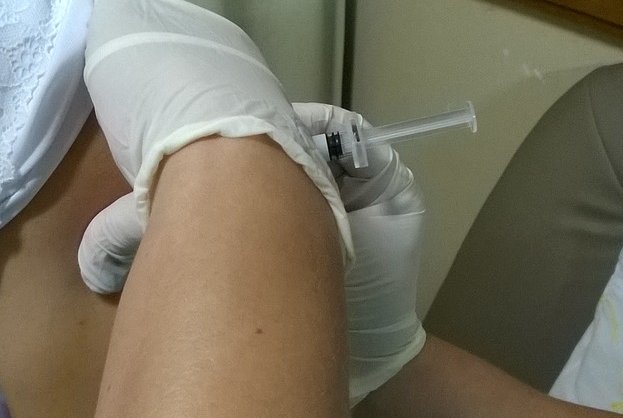A new study has found the "Oxford" COVID-19 vaccine is safe, particularly in older adults. Photo by marcolohpsoares/
Pixabay
Nov. 18 (UPI) -- A COVID-19 vaccine under development in England safely promotes an immune response against the virus, particularly in elderly recipients, a study published Thursday by The Lancet found.
The study's 560 healthy adult participants included 240 people over age 70, according to the researchers.
That the vaccine was found to be safer in older adults than in younger people is significant, given they are at increased risk for severe illness from the new coronavirus, the researchers said.
"The robust ... responses seen in older people in our study are encouraging [because] the populations at greatest risk of serious COVID-19 disease include people with existing health conditions and older adults," study co-author Dr Maheshi Ramasamy said in a press release.
"We hope that this means our vaccine will help to protect some of the most vulnerable people in society, but further research will be needed before we can be sure," said Ramasamy, a professor at the University of Oxford, which is leading the research.
The so-called "Oxford vaccine," formally known as ChAdOx1 nCoV-19 and developed in conjunction with drugmaker AstraZeneca, is one of more than 120 being evaluated in response to the COVID-19 pandemic.
To date, 48 of these vaccines have gotten into in clinical trials to assess their safety and effectiveness.
The study published Thursday is a Phase 2, which is the second stage of research and development for a drug or vaccine. Phase 2 trials evaluate the safety of a product, but not necessarily the effectiveness.
Phase 3 trials are ongoing to confirm the new results -- as well as how effective the vaccine is in protecting against infection with COVID-19 -- in a broader range of people, including older adults with underlying health conditions, according to Oxford.
For the current study, researchers enrolled 560 participants -- 160 ages 18 to 55, 160 ages 56 to 69 and 240 ages 70 and older.
Study participants received either the vaccine at a low or standard dose or a placebo, the researchers said.
In addition, participants age 55 and older were given either a single dose of vaccine or two doses 28 days apart.
The vaccine induced antibodies against the new coronavirus 28 days after a single low or standard dose across all age groups, the researchers said.
After the booster dose of the vaccine, antibody levels increased at day 56 of the trial, irrespective of dose or participant age.
By 14 days after the booster dose, 208 of the 209 participants who received it had neutralizing antibody responses, which means their immune systems were producing cells called antibodies to fight off the virus, according to the researchers.
Side effects to the vaccine were less common in older adults than in younger adults. Symptoms such as temporary pain, tenderness, redness and swelling at the site of the injection occurred in 88% of participants ages 18 to 55 and 66% of those ages 56 and older, the data showed.
Within seven days of injection, 86% of 18-to-55-year-olds developed systemic symptoms, such as temporary fatigue, headache, malaise, fever and muscle aches, as opposed 70% in those over age 56.
Participants will continue to be monitored for any serious adverse events for one year following final vaccination, the researchers said.
Other COVID-19 vaccines have also been shown to generate immune responses in older adults -- including the Moderna mRNA vaccine -- while others have yielded lower responses in older adults, the Oxford researchers said.
This latter group of vaccines includes the CanSino single dose adenovirus-vector vaccine, the Pfizer/BioNTech mRNA vaccine and the SinoPharm/Beijing Institute of Biological Products inactivated viral vaccine, they said.
"The World Health Organization has outlined a number of critical factors for COVID-19 vaccines, including that they must be targeted at the most at-risk groups, including older adults. They must also be safe ... and provide at least six months of protection," study co-author Sarah Gilbert said in a statement.
"Our new study answers some of these questions about protecting older adults, but questions remain about effectiveness and length of protection," said Gilbert, a professor at the University of Oxford.















